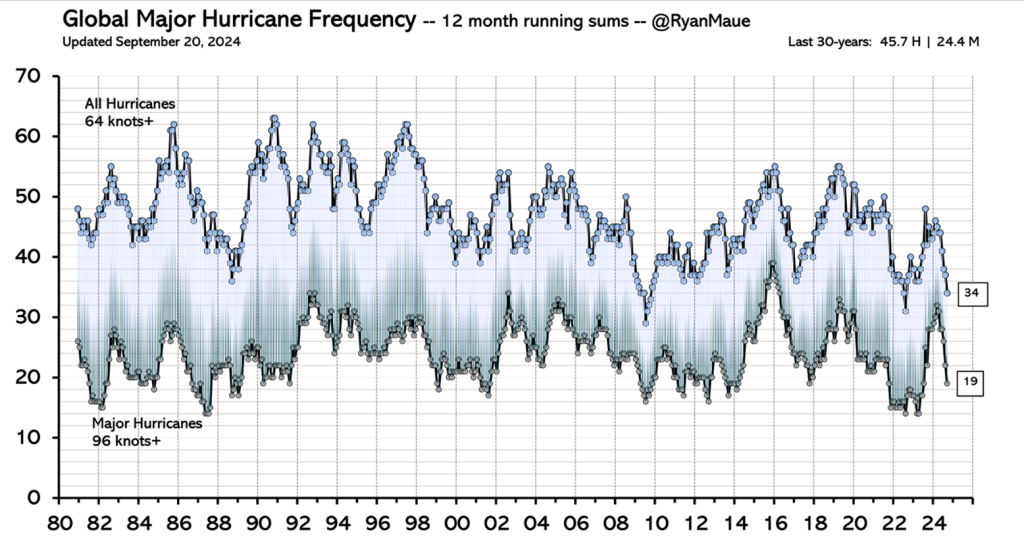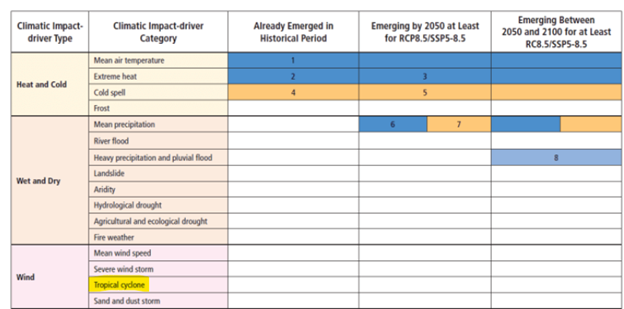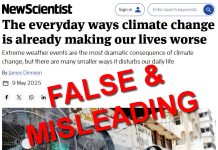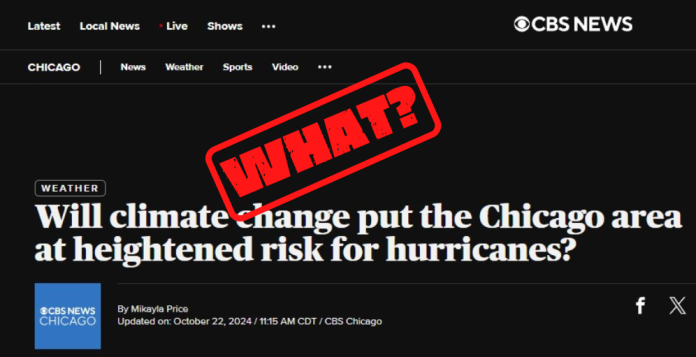A recent article posted by CBS News, Chicago asks the question on nobody’s mind: “Will climate change put the Chicago area at heightened risk for hurricanes?” This question and the thinking behind it are ridiculous. Although it is true that the remnants of tropical storms and hurricanes can reach Chicago, and have in the past, there is little reason to think that climate change will make it more likely to occur in the future or more severe if or when it does.
CBS claims that the recent hurricane Helene “brought tropical flooding to inland regions not typically at risk,” warning that it’s now clear that “climate disasters can happen anywhere.” Besides the obvious issue of CBS conflating climate (long term average) with weather (a short term event), it is also untrue that it’s unusual for hurricanes to bring heavy rain inland. In fact, hurricane related flooding has occurred in the Appalachians long before industrialization could be blamed. The flood of 1916 in Asheville, North Carolina was much worse than this recent one.
If that wasn’t silly enough, CBS turns to the unscientific realm of rapid attribution studies to claim that human contributions to climate change “fueled Milton’s rapid intensification, according to Climate Central,” and asks the question “[a]s the impacts of climate change get worse faster, what, if anything, could reach Illinois now or in the future from hurricanes?”
This question carries a tiny thread of truth, that is, that the remnants of tropical storms and hurricanes can and do affect regions far away from the coasts, with CBS giving the examples of Hurricane Ike and Tropical Storm Lowell, the latter of which which caused flooding in Chicago that was severe enough to warrant an emergency declaration in 2008. However, this is not new, and the evidence CBS uses to try to frighten readers into believing that hurricanes will soon pose a greater threat up north is mere propaganda and not real data.
CBS cites Climate Central, a climate activism and advocacy group which is often caught spreading fake news and misleading information about climate science in order to push alarmist narratives. For instance, they touted the University of Maine’s faulty climate reanalyzer in 2023 as though it represented measured data when it does not. CBS also references rapid attribution analyses from groups like World Weather Attribution. Climate Realism has covered their false “science” assertions many times, where they use counterfactual computer models to claim that any given storm is the result of human-caused climate change. There will never be a weather event that World Weather Attribution can’t tie to climate change, because they begin with the assumption that climate change juices every weather event.
The reason mainstream media organizations like CBS rely on attribution study groups instead of real data, is because the available data do not show that hurricanes are getting more intense, wetter, or more frequent. Although Climate Realism has covered hurricanes many times this season (here, here, and here, just in the last 2 weeks), it is worth going over the facts again.
Major hurricanes, according to global hurricane frequency data, are not getting more common, nor are less powerful hurricanes. (See figure below)

In regards to strength, there is no demonstrable increasing trend in global accumulated cyclone energy. If that’s not enough, the Intergovernmental Panel on Climate Change’s Sixth Assessment Report, in Chapter 12, Table 12.12, identifies no connection between tropical cyclones and climate change. Not in the present, or the future, even under extreme emissions scenarios. (See figure below)

Facts are inconvenient for climate hucksters like CBS, which end up looking like fools trying to ignore reality in order to frighten readers in places like Chicago. Yes, the remnants of a hurricane or tropical storm can make it up to Chicago, but no, there is no indication that such occurrences are common or are set to become a frequent problem in the future. CBS has to know this, otherwise they would not rely so heavily on the nebulous claims of attribution artists.



















